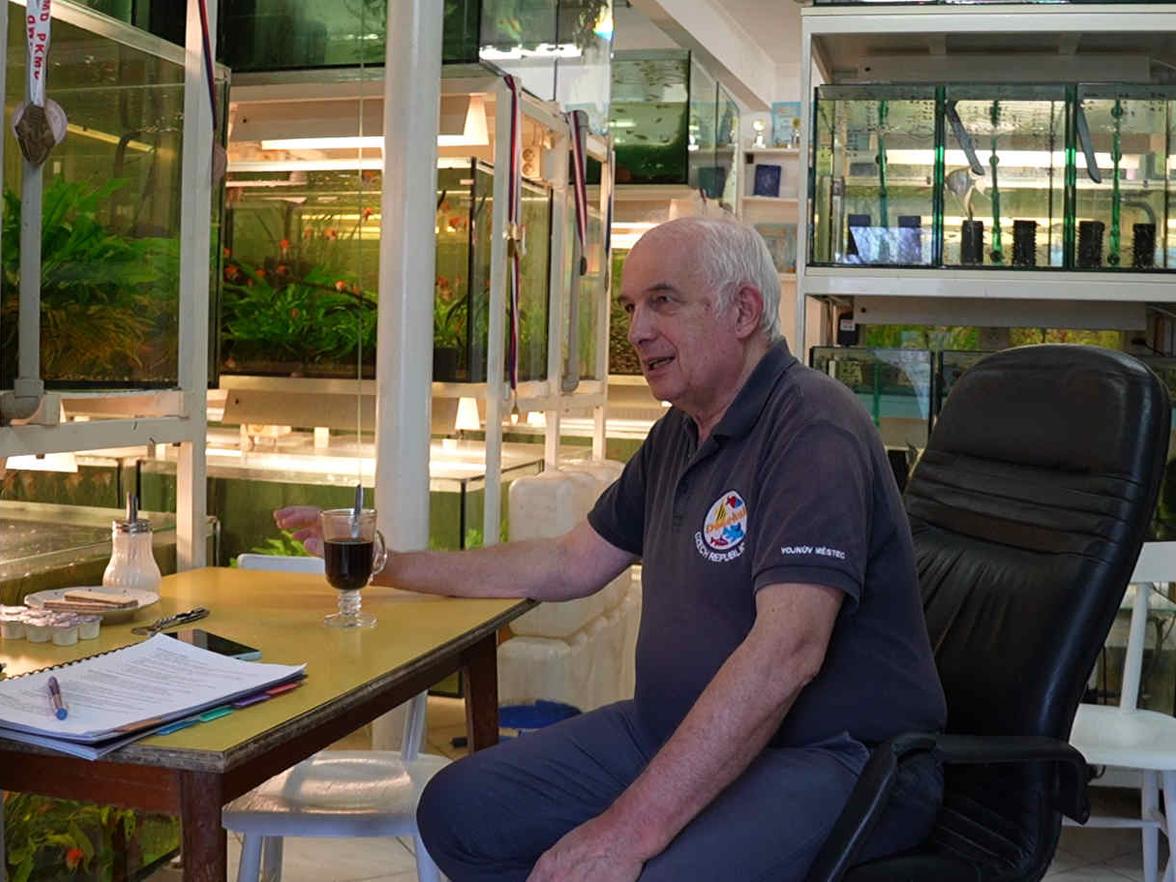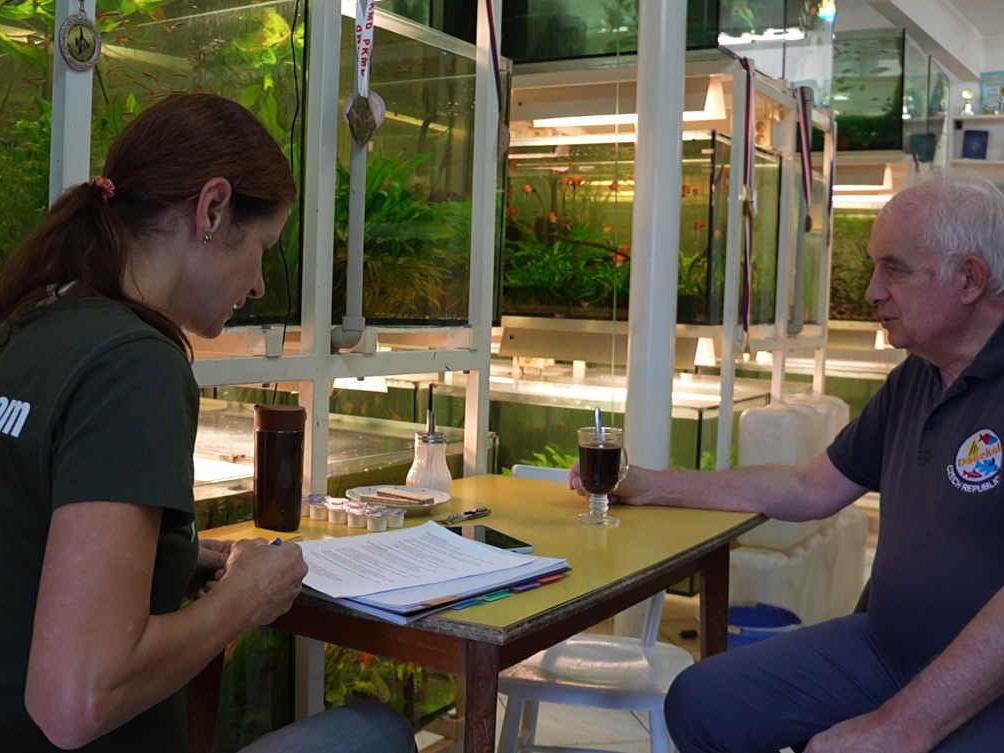How did it start in Czechoslovakia at the turn of the 70s and 80s? What does a professional aquarist's day look like? What is the difference in exports compared to the communist era, after the coup and today? How are we doing in terms of societies and exhibitions? Do aquarists visit Germany and why do they like it so much in the Czech Republic?
I’m very happy that I had the opportunity to visit this renowned aquaristics site near Žďár nad Sázavou and conduct this (eventually six-part) interview. The atmosphere was fantastic from the very beginning. The fish breeding facility is characterized by clean, beautifully arranged aquariums with plants. Medals shine on the shelves, and the air is filled with a pleasant tropical humidity. The fish, as if they knew they could be proud of their breeder, curiously watched me the entire time and swam over as if to greet me as I walked through the facility.
Now, let’s hear in this friendly environment how it all started and what it looks like today. The first part of the interview with the leading Czech aquarist, Zdeněk Dočekal (with whom, thanks to my ČCK membership, I’m on a first-name basis):
What inspired you to become an aquarist?
There were several things. When I was in school, a classmate of mine had aquariums. As kids, we used to visit each other, and I liked it a lot. So I’ve known about aquariums for a very long time.
Then I went to the army. Two years after I returned and got married, we couldn’t go out as much as before. I had to spend more time at home. So I thought, I’ll get myself an aquarium.
I changed jobs to get an apartment. Coincidentally, two colleagues at work had aquariums. I visited one, then the other, and that’s where it caught me.
So I got one, and that’s how it all started.
And what were your first fish?
The guys were advanced. My first fish were red neon tetras.
I kept them for about a year. Then one of my friends said, “Now you need to start.” I replied, “I don’t know,” and he said, “I’ll come over.” He came over on a moped. We didn’t have cars back then.
So we made some breeding tanks, four of them. Then I asked, “What water should I use?” So we went into the forest to get water... And that’s how I began.
So you used really high-quality water...
Yes, those guys who were doing it already had everything figured out. So at the start, I was lucky to meet people who really knew their stuff back then.
That’s a big advantage. I can confirm that it’s great when you get lucky with good teachers. What does your typical day look like now?
You actually divide your week into two parts: one part when you’re out and another when you stay in.
Here are the breeding tanks where fish are placed for reproduction. (He points to a shelf behind me.) That’s how it starts. I put pairs in there. I haven’t been doing it recently because it’s been such chaos that I wouldn’t have time to fit everything in. (Note: The interview took place after the ČCK Congress.)
Otherwise, I work on tasks related to breeding fish. On Sunday evenings, I prepare the offer for the stores I’ll deliver to during the week. On Mondays and Tuesdays, I have relatively free time. On Wednesdays, I start placing orders. I have 20 suppliers, and not all of them pick up immediately. It takes 3–4 hours to make the orders for the 8 stores.
In your last interview for Czech Television in 2016, you mentioned that you breed 30 species of fish, supply 30 stores, and export a fifth abroad.
That’s stayed roughly the same – about a quarter goes abroad. It used to be the opposite: 80% abroad and 20% local.
When the Euro came, it was still good. But then the exchange rate started to drop. At one point, it was 30 Kč per Euro, then 32 Kč. So those who exported could pay well.
But as the Euro began to fall, they started getting less and less when they came back from Germany. And they wanted us to sell for less and less too. Electricity, water – everything keeps going up. So I shifted to delivering to Czech stores.
Now about a quarter goes to England. A bit also to Germany, but not as much.
What’s the situation abroad?
In Germany, it’s not as common to visit each other. They have clubhouses where they meet. When they meet at home, it’s only among VIPs.
When the Swiss started coming to us, they visited me and others – not just for lectures but also for the experience.
Even during communism, it was known that we in Czechoslovakia were skilled in aquaristics.
Which aquaristics event has impressed you the most recently?
The highlight is the exhibition in Rychnov. In the past, there were more exhibitions, but now Rychnov is the only one left – and it’s also the best and biggest. Previously, for example, the Pilsen clubs held exhibitions when Láďa Protiva was still there, but now they only hold exchanges, not exhibitions. Before the revolution, clubs were in many cities, and everyone did something - even smaller exhibitions, various sales.
Now it has been reduced completely. I don't know if anyone in the Czech Republic would still hold an exhibition. I think it is the last one. Fortunately, it is the best and largest. So, there is a great tradition, and it has been around for about 45 years.
Exactly…
And if it weren't for COVID, they would have been on a roll. I've been helping them with the assortment for years. On Friday, I deliver fish there, go home quickly to feed them, then I'm there Saturday, Sunday, and on Wednesday, I go back for the fish.
I found it amazing this year how professional it was and how much work it must have taken...
They start in June. It's their home, so that's an advantage. When you do something in a cultural center, they charge you for every hour.
For example, this year in Lysá n. Labem, they had a short time to prepare. And then they had to move everything quickly because there is another exhibition after that. So that the next group can prepare. Things are bustling there.
Not all club members work, but there used to be more people for the work.
What is the situation abroad?
In Germany, it's not so much about visiting. They have a clubhouse, meet in the clubhouse. But those are really just VIPs when they meet at home.
When the Swiss started coming to us, they came to me, to others, and really, it was mainly for that. Not just for the lectures.
Even during communism, we were always known for being skilled in aquaristics in Czechoslovakia.
Yes, that was known because we all went to work and we all had almost the same. Those who wanted to earn extra had the opportunity with aquaristics. And it was good that the state exported it, and they always cried that there were no currencies. Well, when we exported fish, then Western goods were bought, like Tetramin. If they had to buy it just for us, they wouldn't have bought it. But because goods were exported, then it was possible. There were 3 companies. Two in Prague and one in Bratislava - Chovprodukt, where they exported to Austria. Mr. Ambrož in Petržalka had a purchase office where I got two crowns more for a scalare than in Prague. In Prague, Mr. Jaroch bought for Gardens, forests, gardening. And then Mr. Vrzal bought for Zverimex.
But they bought it, and it went through Koospol. It was a trading company, but I think almost everything went through it. Then came the revolution, and things got going. I only spoke Czech and Slovak, so I didn't make it abroad. But I also had a very good outlet.
And now I also hold events here.
I have a place for 48 people, but I know 200 people.
The next part of the interview will be published on November 27, 2024




